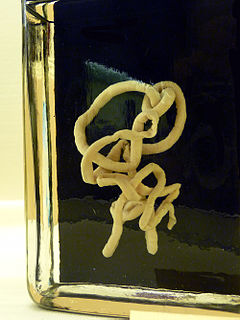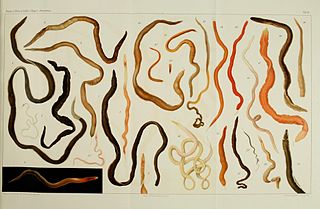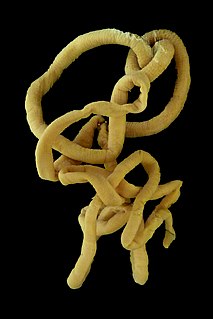 W
WAnopla has long been used as name for a class of marine worms of the phylum Nemertea, characterized by the absence of stylets on the proboscis, the mouth being below or behind the brain, and by having separate openings for the mouth and proboscis. The other long used class of Nemertea are the Enopla. Although Anopla is a paraphyletic grouping, it is used in almost all Scientific classifications. Anopla is divided into two orders: Palaeonemertea and Heteronemertea.
 W
WHeteronemertea is a monophyletic order of about 500 species of nemertean worm. It contains genera such as Lineus and Cerebratulus, and includes the largest and most muscular nemerteans.
 W
WPalaeonemertea is an order of primitive nemertean worm. It may be para- or polyphyletic, consisting of three to five clades and totalling about 100 species.
 W
WBaseodiscus mexicanus is a species of proboscis worm in the family Valenciniidae.
 W
WCerebratulus lacteus, the milky nemertean or milky ribbon worm, is a proboscis worm in the family Lineidae. This ribbon worm has a wide geographical range on both sides of the northern Atlantic Ocean.
 W
WCerebratulus marginatus is a proboscis worm in the family Lineidae. This ribbon worm has an Arctic distribution, and in the North Atlantic Ocean ranges as far south as Cape Cod and the Mediterranean Sea while in the Pacific Ocean it extends southwards to California.
 W
WGorgonorhynchus repens is a species of the proboscis worm in the subclass Heteronemertea and of the family Gorgonorhynchidae. It is to be found on the seabed in shallow water in the Pacific Ocean.
 W
WLineidae is a family of nemertean worms. It contains the following genera:
 W
WLineus is a genus of nemertine worms, including the bootlace worm, arguably the longest animal alive. Lineus contains the following species:
 W
WThe bootlace worm is a species of ribbon worm and one of the longest known animals, with specimens up to 55 m (180 ft) long being reported, although this has not been confirmed. Its mucus is highly toxic.
 W
WParborlasia corrugatus is a proboscis worm in the family Cerebratulidae. This species of proboscis or ribbon worm can grow to 2 metres in length, and lives in marine environments down to 3,590 metres (11,780 ft). This scavenger and predator is widely distributed in cold southern oceans.
 W
WTubulanidae is a family of primitive nemertean worms in the order Palaeonemertea.
 W
WTubulanus is a genus of primitive nemertean worms in the order Palaeonemertea.
 W
WTubulanus annulatus, commonly known as the football jersey worm, is a species of ribbon worm in the phylum Nemertea. It ranges across the northern Atlantic Ocean, the North Sea and the Mediterranean Sea, being present from the lower shore down to about 40 m (130 ft), on sand, gravel and other habitats.
 W
WTubulanus polymorphus is a species of ribbon worm in the phylum Nemertea. It is found in the northern Atlantic Ocean and the northern Pacific Ocean. It occurs on the lower shore down to about 50 m (160 ft), on sand or gravel, under stones and among seaweed.
 W
WTubulanus superbus, commonly known as the football jersey worm, is a species of ribbon worm in the phylum Nemertea. Found in the northern Atlantic Ocean, the North Sea and the Mediterranean Sea, it occurs from the lower shore down to about 80 m (260 ft), on sand or gravel.